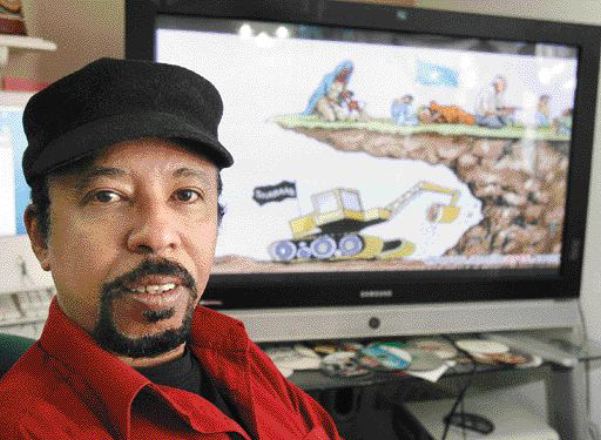Somali
cartoonist draws death threats
(Edmonton,
Canada. February 27, 2009 Ceegaag Online)

CANADIAN FREEDOMS LET ARTIST
THRIVE: Somali artist Amin Amir, above, lives in Edmonton,
where he produces both paintings ... Photograph by:
Rick MacWilliam, The Journal, The Edmonton Journal
This week, Canadians celebrate the freedom to read.
Every day, a Somali man living in Edmonton celebrates the
freedom to draw.
Freedom to Read Week is an annual event in Canada raising
awareness about freedom of expression, which we are
guaranteed in this country. But Amin Amir doesn't need a
designated week to remind him.
The visual artist, who has lived in Canada for nearly a
decade, is famous in Somali circles around the globe for his
political cartoons about Somalia. Satirical, poignant and
often controversial, Amir's cartoons -- which he posts at
Aminarts.com -- address issues facing his home country:
political corruption, war, poverty, famine, murdered
journalists and oppressed women. His website gets up to
10,000 hits a day.
In one cartoon, Amir depicts how an Islamic militia group
undermines society despite its claims that it's helping the
country. Al-Shabaab is portrayed as a bulldozer digging deep
into the side of a cliff. Above the bulldozer, on a
precariously thin strip of earth, Somalia's most vulnerable
people -- women, children, the elderly -- struggle to
survive. Most of the cartoons are in his native language,
Somali.
Amir couldn't make this sort of art in Somalia. "They'd
kill me," he says matter-of-factly.
"If he did this in Somalia, he's in serious trouble; we
know that," Edmonton Somali community leader Mahamad Accord
says. "He's criticizing through his artwork, and they (the
people in power) are not happy about it.
"He won't survive there for a second."
Somalia's nine million people have been without an
effective government since 1991. Famine, disease and
fighting between rival warlords have led to the deaths of up
to one million people.
Edmonton's Somali community, which numbers around 8,000,
admires the artist for speaking out about the issues back
home.
"He's a local hero. Everyone talks about him," Accord
says.
Amir deals regularly with extremists who want him dead
because of his cartoons. He gets anonymous threats as often
as twice a week.
"They send me e-mails, 'We kill you, we know where you
live,' " the artist says with the help of his daughter, Jija,
who translates from Somali to English. "I'm not scared. If
the (Somali) government does something bad, I want to tell
people.
"I don't stop my cartoons. I'm still doing my job."
When he publishes a controversial cartoon, "the poor
people like me" and "the bad people are not happy," he says.
But "when the poor people are happy, I'm happy too, I'm
satisfied."
Amir's wife, Zenaib Ibrahim, is proud, too. "My husband,
he talks about the people who don't have a voice, who are
poor."
Amir and his family left Somalia in 1992. The family
moved to Canada in 2000 after a stint in Djibouti, settling
in Montreal. They moved to Edmonton two years ago.
Thanks to the freedom of expression in Canada, Amir earns
a living as an artist through his commercial website, along
with contracts at various publications. He is also a painter
and sells his works. In 2007, Amir was one of 18 Edmonton
artists to win an Explorations Grant, a program established
during the city's Cultural Capital Program. Amir's grant of
$7,500 allowed him to create 30 oil paintings depicting the
role of Somali women in family and society.
He is motivated to speak out on behalf of Somalia's most
vulnerable citizens because they can't speak out themselves.
"When bad things happen, the first people affected are women
and children," he explains through Jija.
The cartoons hit home with Mayran Kalah, an Edmontonian
who left Somalia in 1995. "When I see his (Amir's) pictures,
I know exactly what he's talking about," she says. "As a
woman, it touches me."
She says Amir's hard-hitting cartoons make Somalians
laugh, but also remind those who have left their home
country: "Don't forget."
When asked if he'll ever return to Somalia, he laughs and
says "maybe later." Judging by his grin, and the sarcasm in
his cartoons, it would seem that's a very big maybe.
"Freedom is good," he says.
Source: edmontonjourna

webmaster@ceegaag.com |

